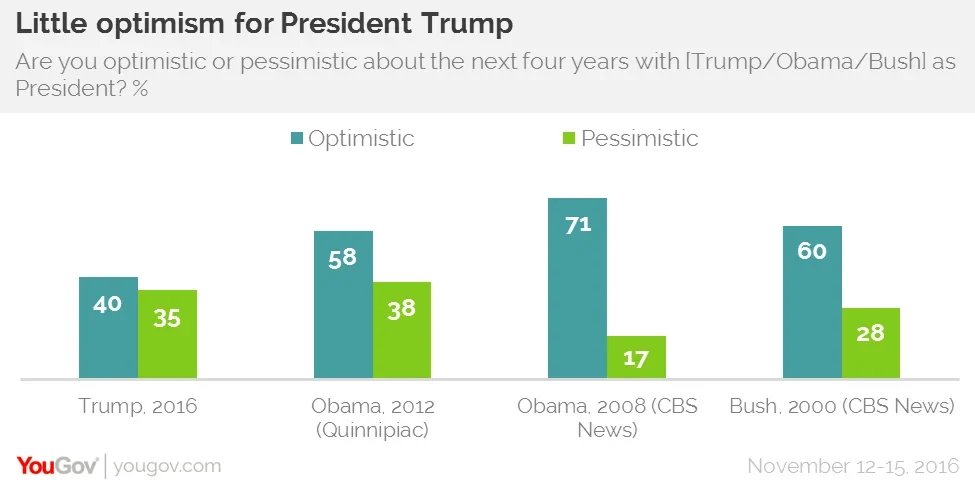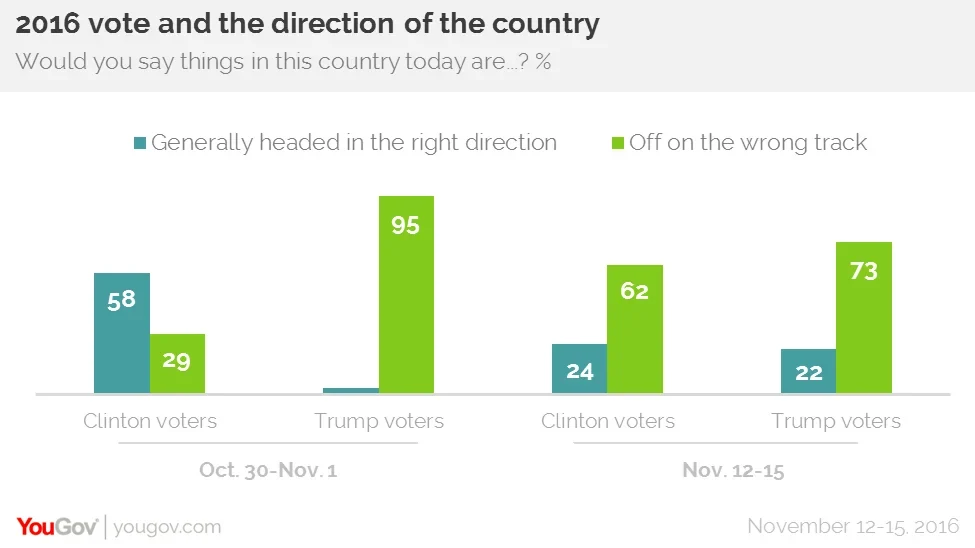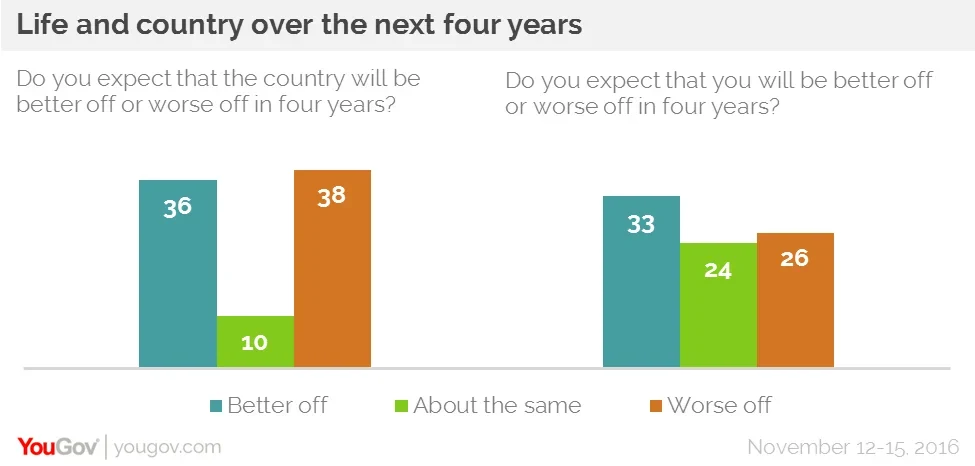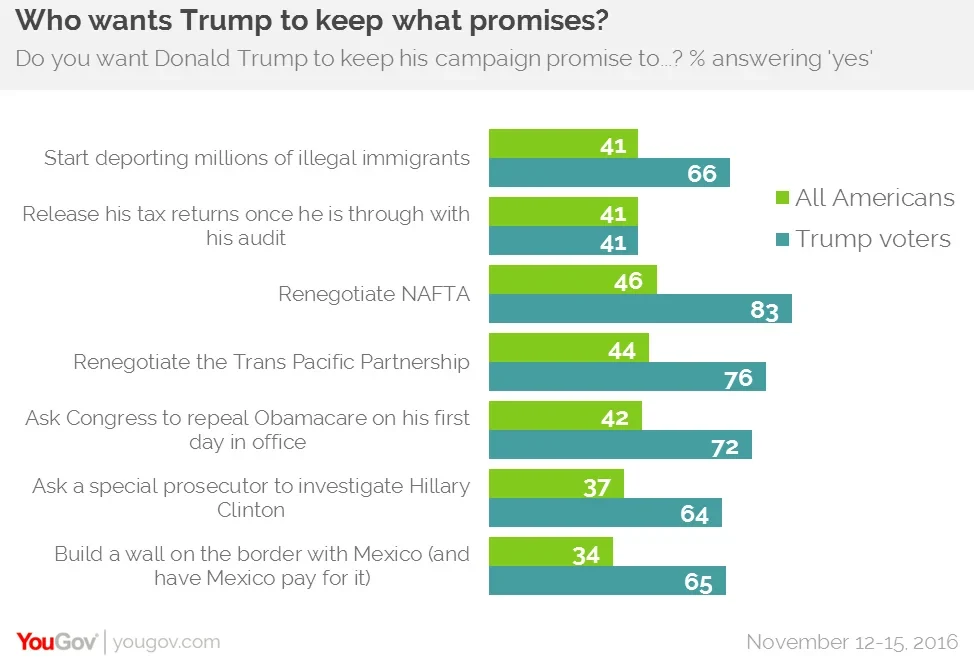Optimism for Trump's presidency is notably lower than in prior elections
Even voters who supported Donald Trump aren’t sure the country is headed in the right direction – and while they like his proposals, their preferences don’t match those of the public at large, a public which is unclear about what Trump will accomplish in office and opposes most of his promises. Two-thirds of voters in the post-election Economist/YouGov Poll said they – like many in the media – were surprised by the outcome, so expectations of what a Trump Presidency would be like are still being formed.
Looking ahead, Trump may not enjoy any sort of honeymoon at all.

Americans are as likely to be pessimistic about the next four years with Trump at the helm in Washington as they are to be optimistic, suggesting that there is – as of yet – no rallying around the President-elect. Typically, Americans are optimistic when there is a new President. In both 2008 and 2012, Americans were optimistic about the Obama Presidency, and by wide margins. Even after the contested 2000 election was finally ended by the U.S. Supreme Court in December 2000, 60% said they were optimistic about the next four years with George W. Bush in charge.
Both before and after this election, Americans believed the country was on the wrong track, and by a more than two to one margin. They still say it is, and in an unusual show of party unity there is no difference between those who voted for Trump and those who favored his opponent, Hillary Clinton on this question. Before the election, Clinton voters saw the country as headed in the right direction, while Trump voters strenuously disagreed.

The shock of the election (even half of Trump’s own voters said they were surprised at his victory) may have tempered future expectations, after a campaign that was mired in attacks between the nominees. For the most part, minds were made up long before the election: only 9% of those who voted for Clinton ever considered voting for Trump; 13% of Trump voters said they considered supporting Clinton. And registered voters who did not cast a ballot last week also split closely between the two major party candidates, with a small lead for Clinton. Of course, their votes would have made a difference in the outcome only if those voters lived in the few critical, close states that put Trump over the top in the Electoral College vote. Here is an analysis of the difference between the final YouGov polls and the election results.
There are other signs of disunity in the public: Americans are as likely to think the country will be worse off in four years as to say it will be better off. (They are only a little less pessimistic about their own futures). 30% think the country will be more respected in the world in four years, though 37% say it will be less respected.

Trump’s campaign was always troubled by a belief among a majority of voters that he was not qualified for the job of President. In the Economist/YouGov final pre-election poll, 55% of registered voters said he was not qualified for the job. That’s still a problem for the President-elect. Only four in ten say he is at least somewhat qualified to serve as President. 45% believe he is not qualified at all. Just as many personally don’t like President-elect Trump at all (compared with just 25% who say that about President Obama).
There are other Trmp weaknesses.
- 56% say it’s unlikely his administration will set a high moral standard
- 54% don’t expect an open and transparent administration
- 52% don’t think he will improve government
Instead, 55% say it is likely he will use the office to enrich his family and friends.
On the policy side, the expectation is that taxes will be cut, and Obamacare will be repealed
Trump voters were for the most part on the same page as their candidate when it came to his campaign promises: two in three Trump voters want to build a wall on the Mexican border, appoint a Special Prosecutor to investigate Hillary Clinton, and deport illegal immigrants. Even more of his voters want him to ask Congress to repeal the Affordable Care Act on Day 1, renegotiate the Trans Pacific Partnership and the North American Free Trade Agreement. Most see no need for Trump to release his tax returns, even after an audit is completed.

None of these promises receives support from a majority of the American public.
For the most part, Trump voters expect the President-elect to keep those promises. And Americans overall expect him to keep at least one: half the country expects there will be fewer illegal immigrants in the United States four years from now than there are today.








